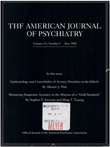Differences in neuropsychological and academic achievement between adolescent delinquents and status offenders
Abstract
OBJECTIVE: This study sought to determine whether neurocognitive factors could discriminate delinquents brought before a juvenile court in a large urban area from nondelinquent status offenders brought before the same court. METHOD: Psychological tests were administered to 216 adolescents, aged 13-15 years, presenting to a large urban juvenile court. One hundred ten delinquents (65 male and 45 female) were compared to 106 high-risk nondelinquents (65 male and 41 female) on the WISC-R subtests, the Wide Range Achievement Test, and the Memory for Designs Test. RESULTS: Discriminant analysis revealed that the male delinquents could not be discriminated from the comparison group of male status offenders on the basis of scores on any of the measures. Among the female subjects, scores on reading, arithmetic, digit span, and picture completion subtests and the Memory for Designs Test differed significantly between groups, with some of the findings favoring status offenders and others favoring delinquents. CONCLUSIONS: Overall, the findings did not support the hypothesis that inferior intelligence is an independent risk factor for delinquent behavior.
Access content
To read the fulltext, please use one of the options below to sign in or purchase access.- Personal login
- Institutional Login
- Sign in via OpenAthens
- Register for access
-
Please login/register if you wish to pair your device and check access availability.
Not a subscriber?
PsychiatryOnline subscription options offer access to the DSM-5 library, books, journals, CME, and patient resources. This all-in-one virtual library provides psychiatrists and mental health professionals with key resources for diagnosis, treatment, research, and professional development.
Need more help? PsychiatryOnline Customer Service may be reached by emailing [email protected] or by calling 800-368-5777 (in the U.S.) or 703-907-7322 (outside the U.S.).



